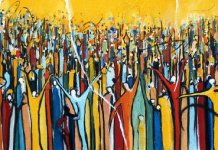New Zealand catches me between two arms, as it were; one in the past and the other in the present.
The past is a memory. It’s the memory of a man who was an awkward bearded Kiwi law don. He used to invite a number of us who were law students to his rooms in the late evening to argue over ideas. We drank and argued. He helped me to learn to think; more importantly, he taught me never to be afraid of ideas I found alien or alarming.
Later, during the quarter century I taught at university, with a nod to him over my shoulder, I ran an open seminar called ‘Sceptics Anonymous.’ It followed the same principle; anything was up for discussion. We turned ideas upside down and inside out. Sometimes we changed our minds. Just ten years ago, most people thought that was in part what university was for. But in the last few years, things have changed with breath–taking speed.
This last week the Canadian psychology professor Jordan Peterson had the offer of a Fellowship that Cambridge University had made him withdrawn. He found out from twitter. A spokeswoman said “Cambridge is an inclusive environment. There is no place for anyone who cannot uphold our inclusive principles.”
‘Inclusive’ is of course a coded word that has now come to be indelibly associated with the Cultural-Marxist project. It is a word designed to include some values and some people, and emphatically exclude others. Even the word does not tell the truth about itself. And it’s obvious, when you know a little history that Marxism, cultural or economic, doesn’t allow people to voice other ideas. It’s not just Cambridge. Oxford University are trying to harass and shame Nigel Biggar, who teaches that there are two sides to everything, including the legacy of colonialism (education, health, roads, democracy, rule of law etc.)
To many of us it is still mind-bogglingly strange that the whole of our Higher Education system could fall into the hands of people who will only allow certain ideas, outlaw others, and are determined to stop people thinking and discovering for themselves.
And that is exactly what propelled Jordan Peterson to fame. He refused to be told what words he must and must not use. People have since come flocking to listen to him and be inspired.
The Left tried to miscategorise him as ‘alt-right’, hard right, fascist, anything to close him down and shut him up. But they failed. He describes himself as Left in some matters and Right in others; like many of us.
Back to New Zealand and the present. The murderous massacre at Christchurch has been hard to deal with at many levels. Of all events this one required making a distinction between the innocent victims and the association of ideas.
The Media lamented profoundly with the victims; rightly. But so deep did its sympathies run, that it told only one side of a wider story. 49 people were killed by a callous white secular Australian murderer in the Christchurch Mosque. But in the same week, 140 Nigerian Christians were butchered by their Muslim neighbours; and the media were silent. Sometimes what you don’t say is as powerful a way of distorting the truth as telling a lie.
The way we respond to ideas has morphed. They work differently now. We experience them more like a virus spreading a plague than they do building blocks one can take and reshape and build concepts and patterns out of.
Someone discovered a photo of Jordan Peterson taken by a company that makes money through having fans pose next to a celeb.
This fan was wearing a T shirt which said that he was against “paedophilia, rape, wife beating, homophobia, misogyny, violence against women and children.” Not so bad you might think. Who is not against them? But they were a subtitle to “I am a proud Islamophobe.”
It wouldn’t be hard to find people whose experience matched the T shirt. The Yazidis for example. But instead of acting like an idea to be rebutted, or modified or qualified or endorsed, it acted like an infection instead; and because Peterson stood next to it he was infected by association.
Peter Tatchell, whom I have admired for a long time, wrote in the Times recently how he had experienced the slur of Islamophobia when he had protested against an Islamic group called Hizb ut-Tahrir, who endorsed the killing of LGBT people and Muslims who leave their faith. He wants to be able to criticise ideas and not to be thought to be condemning people.
Tatchell’s right. We have to be able to talk about ideas without being accused of hating people. Listening to Peterson, he has been careful to say that Islam lies beyond his area of expertise and he is unwilling to say anything much about it.
If the old universities have given way to doctrinaire censorship and mob rule by the Left, perhaps the only hope is for someone or some group to found a new university, and brand it a ‘university of free speech.’ It might become popular. It might catch on. It would appeal to people who wanted to chose freedom and hope rather than control and fear. There may still be some left.










